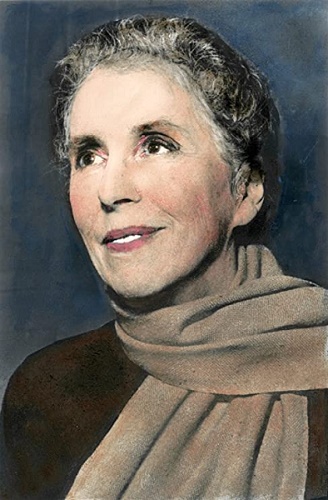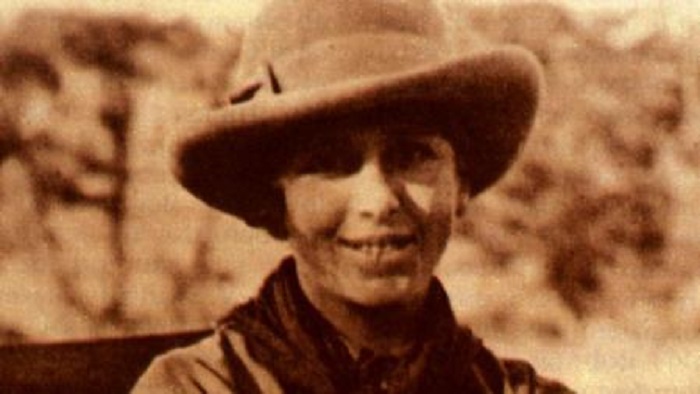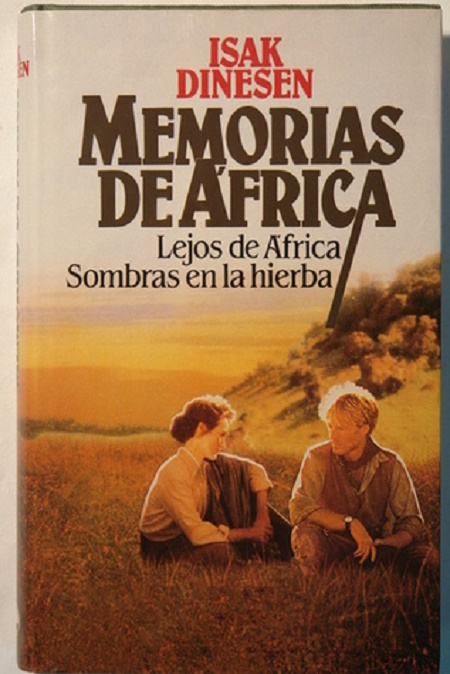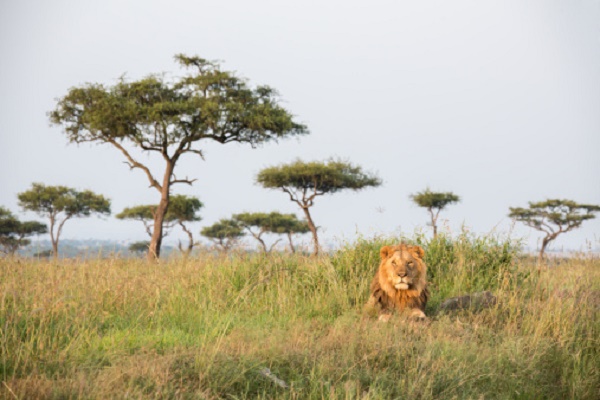 Retrato de Isak Denisen - [Fuente | Source](https://www.amazon.com/-/es/P%C3%B3ster-Dinesen-1885-1962-Npseudonym-Photograph/dp/B07CFZ4R5H)
A Isak Dinesen la conocía por algunos de sus cuentos como [“Una historia inmortal”](https://www.literatura.us/idiomas/id_lhu.html), del que el cineasta Orson Welles hiciera una [versión fílmica](https://es.wikipedia.org/wiki/Una_historia_inmortal) del mismo título en 1968 (existe en YouTube la versión sin subtítulos en español: [*](https://www.youtube.com/watch?v=42i7zI6ZJ6w&t=309s)), o [“El festín de Babette”](https://narrativabreve.com/2013/11/cuento-karen-blixen-festin-babette.html), del cual se hiciera también una [versión en cine](https://www.youtube.com/watch?v=nSwrnmEThZ8) de título homónimo por el director danés Gabriel Axel, que recibiera un premio Óscar en 1987 a mejor película en lengua no inglesa. Pero la lectura que más me tomó de su obra había sido su hermosa novela autobiográfica, [***Memorias de África***](https://es.wikipedia.org/wiki/Memorias_de_%C3%81frica_(novela)) (también traducida con el título ***Lejos de África***, que es el que tengo). Isak Dinesen, producto de su primer matrimonio, se había ido a vivir a África, donde vivió por diecisiete años. Su residencia en Kenia, donde atendió una plantación de café, estuvo signada por varios dramas, como la muerte en accidente aéreo de su segundo marido, pero estableció una relación de identificación emotiva con la zona, con sus habitantes –los *maasais*– y su cultura, y luego tuvo que regresar a Dinamarca. Esta novela también fue llevada al cine; esta vez por el cineasta norteamericano Sydney Pollack en 1985, que puede conseguirse como *Out of Africa* en inglés o *Africa mía* en español. Recibió siete premios Óscar (ver su tráiler [*](https://www.youtube.com/watch?v=X9H48tKA6xw)).
 Foto de Karen Blixen - [Fuente | Source](https://www.lavanguardia.com/reportajes-fotograficos/20120907/54345413785/radiografia-de-la-honorable-baronesa-de-africa.html)
_I knew Isak Dinesen for some of her stories such as ["An Immortal Story"](you can read it [here](https://gutenberg.ca/ebooks/blixenk-anecdotesofdestiny/blixenk-anecdotesofdestiny-00-h-dir/blixenk-anecdotesofdestiny-00-h.html#tocchapter04)), of which the filmmaker Orson Welles made a [film version](https://en.wikipedia.org/wiki/The_Immortal_Story) of the same title in 1968 (there is a version without English subtitles on YouTube: [*](https://www.youtube.com/watch?v=42i7zI6ZJ6w&t=309s)), or ["The Feast of Babette"](you can access it at this [link](https://gutenberg.ca/ebooks/blixenk-anecdotesofdestiny/blixenk-anecdotesofdestiny-00-h-dir/blixenk-anecdotesofdestiny-00-h.html#tocchapter02), of which a [film version](https://www.youtube.com/watch?v=nSwrnmEThZ8) of the same title was also made by the Danish director Gabriel Axel, which received an Oscar award in 1987 for Best Foreign Language Film._ _But the reading that took me most of his work had been his beautiful autobiographical novel, [***Memories of Africa***](https://en.wikipedia.org/wiki/Out_of_Africa) (also translated with the title ***Far from Africa***, which is the one I have). Isak Dinesen, the product of his first marriage, had gone to live in Africa, where he lived for seventeen years. Her residence in Kenya, where she tended a coffee plantation, was marked by several dramas, such as the death in a plane crash of her second husband, but she established a relationship of emotional identification with the area, with its inhabitants - the *Masais* - and their culture, and then had to return to Denmark._ _This novel was also made into a film, this time by the American filmmaker Sydney Pollack in 1985, which can be obtained as *Out of Africa* in English or *Africa mía* in Spanish. It received seven Oscars (see its trailer [*](https://www.youtube.com/watch?v=2EW2kNCmZZ0)]._ A continuación mi ejercicio poético | The following is my poetic exercise: 1
 [Fuente | Source](https://shop87002.lemaprod.com/content?c=lejos%20de%20africa%20isak%20dinesen&id=4)
### Lejos de África #
Kenia seguía en su corazón, quizás enterrado en sus colinas. Volvía en la puesta de sol o en el sonido del viento en los arbustos. Y entonces fueron los ojos de su marido muerto durante una expedición de caza. La muerte y la soledad, el abandono de la amada África. La tristeza instalada en su alma, y la sonrisa de Denys, el sabor del café por la mañana y ese aroma ahora nostálgico.
Isak Dinesen (o Karen Blixen)
volvía a esas colinas de Ngong
en su memoria ahora escrita.
"Quizá debería haber muerto en Kenia", pensaba,
"para ser tierra en esa colina,
recordada por los maasai
y visitada por los leones".

[Fuente | Source](https://www.istockphoto.com/es/foto/macho-le%C3%B3n-en-kenia-de-masai-mara-gm155446987-21293272)
### Away from Africa
#
Kenya was still in his heart, perhaps buried in their hills. It was returning in the sunset or the sound of the wind in the bushes. And then it was your husband's eyes died during a hunting expedition. Death and loneliness, the abandonment of beloved Africa. Sadness installed in his soul, and Denys' smile, the taste of coffee in the morning and that now nostalgic aroma.
Isak Dinesen (or Karen Blixen)
was returning to those Ngong hills
in his now-written memory.
"Maybe I should have died in Kenya," he thought,
"to be land on that hill,
remembered by the Maasai
and visited by the lions".
#### Referencias | References:
Dinesen, Isak (2004). *Lejos de África*. España: Círculo de Lectores.
https://es.wikipedia.org/wiki/Karen_Blixen
https://en.wikipedia.org/wiki/Karen_Blixen

####